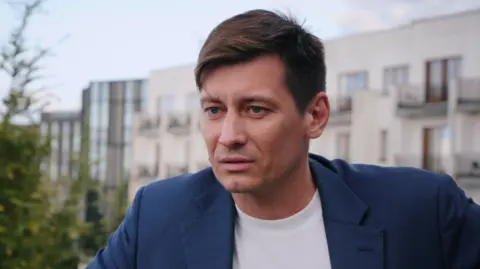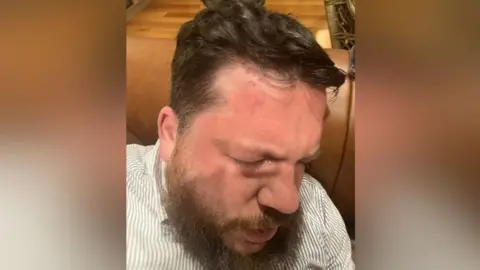 British Broadcasting Corporation
British Broadcasting CorporationWhen Dmitry Gudkov arrived at London’s Luton Airport last summer, two plainclothes police officers were waiting for him. The Russian opposition politician, who lives in exile in an EU country, was flying to the UK to attend a friend’s birthday.
“As soon as I got off the plane, they intercepted me,” Dmitry said. “This has never happened to me before.”
But the police didn’t want to arrest him, but wanted to warn him.
“They told me I was on a list of people at risk. They asked me where I would live and what phone I would use.
Dmitry Gudkov is a co-founder of the Anti-War Committee, an organization that coordinates efforts against the war in Ukraine. He is wanted by Russia for “spreading false information about the Russian military.”
Russia began a full-scale invasion of Ukraine in 2022, triggering a massive crackdown on opposition in Russia. Nearly all activists and independent journalists have fled the country.
Now, some Kremlin critics living in Europe tell the BBC that Russia is stepping up efforts to silence, threaten and persecute opponents abroad. Some people are reluctant to share their stories publicly. The Russian Embassy in London did not respond to a request for comment.
“They can reach people almost anywhere”
Mark Galeotti, an analyst who studies the Russian security services, also believes that operations against Russia’s overseas “enemies” are intensifying. “I think this reflects the growing paranoia of the Kremlin,” he said. “It is embroiled in an existential political struggle.”
With all dissent suppressed at home, Russia is turning its attention to its opponents seeking asylum in the West. Medvedev, the former Russian president and current deputy chairman of the Russian Security Council, described them as “traitors who surrendered to the enemy and wanted the destruction of their motherland.”
British police also contacted another anti-Kremlin activist. “They said they needed to discuss my safety and that of my family,” Ksenia Maksimova told me.
The founder of the Russian Democratic Association in London said police advised her not to travel to certain countries where Russian agents operate more freely.
“[The Kremlin is] It’s absolutely right to step up the fight against the ‘enemy,'” she said. “They are tightening the screws.
She and other activists have noticed an increase in cyberattacks and attempts to infiltrate online organizations.
In a statement to the BBC, a UK Counter-Terrorism Policing spokesman said: “We have been open to the growing demand for casework dedicated to countering national threats for some time… We have been actively increasing the number of cases dedicated to countering terrorism. H.
In December, new British legislation came into effect, giving the police more powers to deal with threats from hostile countries such as Russia.
 Alessiya Malokhovskaya
Alessiya Malokhovskaya “Parasites cannot sleep peacefully…” was one of the messages that investigative journalist Alesya Marokhovskaya received last year.
The threats were also accompanied by the name of the Prague street where she lived. “I moved to make life harder for them,” Alessia said.
“We thought it might just be some crazy Czech guy who supports Putin who recognized me on the street.”
But then the messages became more sinister – calling her a “scumbag” and promising to find her “wherever she goes.”
Alessia’s dog does pant when walking. She notified Czech police.
Later, Alesia will fly to Sweden to attend a conference. The sender then sent more specific threats: details of her flight, seat number and the hotel she had booked. “It was clear that they had high-level access to the files,” Alessia said. “This looks like the behavior of the Russian government.”
Alessia was labeled a “foreign agent” by the Russian government many years ago because of her work at the independent Russian news site iStories.
“When I left Russia and came to Prague, I had the illusion of security,” Alessia said. “Now I realize [Russian intelligence services] It is possible to reach people almost anywhere in Europe. I can’t say I’m not scared, because I am.
 Ivan Zhdanov
Ivan Zhdanov But why is this happening now? Experts say that after a period of turmoil, Russian security services have begun launching overseas operations. Hundreds of Russian diplomats believed to be intelligence agents operating under diplomatic cover have been expelled from Western countries following a sweeping invasion of Ukraine.
“There was a period of chaos after 2022,” said Andrei Soldatov, a Russian journalist who writes about intelligence services. “In 2023, agencies reorganized and found a new sense of purpose. They gained resources and began to increase pressure.
Marc Galeotti says authorities are increasingly turning to agents to do the dirty work – criminal gangs: “If you want someone to get beaten up or even killed, they’re easier to reach,” Galeotti says Mr Tee said he had been writing about the incident.
“They will be some thugs – maybe people that Russian organized crime groups have dealt with at some point.”
The Polish government believes that Leonid Volkov is a colleague of the famous activist and late Alexei Navalny. He was brutally attacked with a hammer in Lithuania Four months ago, but survived.
Polish Prime Minister Donald Tusk said a Belarusian man working for Russian intelligence paid two Polish football hooligans to carry out attacks. All three have been arrested.
“Intimidation is the goal,” said Mark Galeotti. “The idea that you’d better keep your head down. It’s a way to prevent some kind of concerted political opposition from emerging. [to the Kremlin]”.

Russian authorities are also trying to make daily life as difficult as possible for opponents abroad.
21-year-old activist Olesya Krivtsova flees Russia After being arrested and threatened with imprisonment Anti-war posts on social media. She now lives in Norway but recently discovered her Russian passport had been canceled, meaning she could not apply for travel documents.
“I think this is a new [method] Repression,” Olesya said. “They’re always thinking, how can we do more, how can we put pressure on them?”
Several other activists living abroad also had their passports revoked without warning. Many face criminal proceedings in Russia – without a valid passport they cannot hire a lawyer or make payments at home. The only way to solve the problem is to return to Russia.
For Olesia, returning meant being arrested and jailed. She has applied for a temporary Norwegian identity card for refugees.
“In Russia, now I have only one right – the right to go to jail. My passport has been canceled. This shows their cruel nature.
“They have completely destroyed my life and my family’s lives… They will never stop.”


